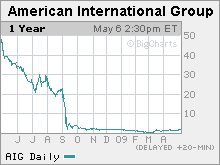AIG: Hoping to stem the bleeding
The bailed-out insurer is expected to report on Thursday that it lost more money in the first quarter, but results could show that the leaks are slowing.

NEW YORK (CNNMoney.com) -- AIG is expected to report its sixth quarterly loss after the market closes Thursday, but the loss could be much smaller than previous quarters and analysts say that could be an encouraging sign.
The insurer is also expected to say that it will not require additional taxpayer funds, according to a report on Bloomberg.com. It would be the first time since the original Sept. 16 rescue that AIG has not announced additional bailout funds when releasing quarterly results.
The company has borrowed roughly $130 billion of $182 billion in loans that the government has made available.
According to news reports that cite sources familiar with the matter, AIG will post a first-quarter loss of $5 billion, compared with a $61.7 billion loss in the prior quarter, which marked the largest quarterly loss ever reported by an American company. Since October 2007, AIG (AIG, Fortune 500) has lost roughly $105 billion.
Analysts say a $5 billion loss and no need for additional taxpayer funds may actually be good news for a company that has fallen so mightily from grace and has come to symbolize the corporate greed that many blame for the depth of the current recession.
"That would be encouraging," said Julie Grandstaff, managing director of StanCorp Investment Advisers. "AIG has been successful in winding down a significant portion of its derivatives business, so losses should be declining. And credit markets are improving, so the derivatives that AIG insures should be gaining value as well."
An AIG spokesman declined to comment.
The fall of a titan. The company was once the world's largest insurer with more than $1 trillion in assets and 74 million customers in 130 countries. But that all changed last year as the company's financial products division went into a tailspin. Credit raters then downgraded AIG, requiring it to post more collateral and ultimately forcing it to seek government help in September 2008.
AIG's financial products division (FP), which is in the proces of being wound down, wrote credit-default swaps -- essentially insurance contracts -- on complex derivatives that were in danger of losing value in the event of a steep drop in the housing market.
That business began to suffer in the summer of 2007, when the U.S. housing market began to deteriorate, and clients asked AIG to post more and more collateral to back the insurance contracts on the devalued assets, such as mortgage-backed securities.
Selling assets. AIG is slowly getting rid of its strong, moneymaking businesses as it attempts to pay back its government loans.
On March 2, AIG transferred its property and casualty businesses into a new, separate company called AIU Holdings. AIG did the same with its AIA Asian life insurance business and ALICO foreign life insurance unit.
The government will eventually take a stake in AIA and ALICO, and on April 22, AIG began the process of selling off a minority stake in AIU to investors. Eventually, all three companies will have their own boards, management and could even trade on the stock market separately from AIG.
AIG has also attempted to sell off many of its other subsidiaries, but those purchases have been small in number and value. The largest of the 10 sold-off units was AIG's car insurance unit, which the company earlier this month announced it would sell for $1.9 billion. The next largest unit was its Hartford Steam Boiler unit, which fetched $745 million.
While that's not chump change, it pales in comparison to the more than $60 billion the company took in from its healthiest insurance units last year.
The company had to give up more than it had anticipated to pay back taxpayers because of the horrid credit environment, and many analysts believe AIG may be giving up too much for it to survive on its own.
The domestic life and retirement insurance companies, which would remain in AIG after its restructuring, wrote about $7 billion in premiums and took in $15 billion in revenue last year. That's about a quarter of the revenue and a tenth of the premiums of the companies with which AIG is parting ways. ![]()

